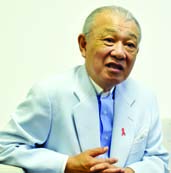
Though Bangladesh has already achieved the leprosy elimination target, WHO Goodwill Ambassador Yohei Sasakawa thinks the country needs a further push with an all-out comprehensive approach to totally eliminate the world’s oldest disease from here.
He said WHO and Nippon Foundation, a Japan-based non-profit private foundation, are going to help Bangladesh take an effective action programme to bring the leprosy situation to a zero level.
In an interview with UNB at the WHO office here, Sasakawa, who arrived here on a three-day visit on Sunday morning, said Bangladesh can include the leprosy issue in school education programme as creating awareness among people about the disease and removing the stigma and discrimination towards the affected people are crucial to achieve the best results in the work of eliminating leprosy.
According to WHO statistics, 3,000 to 4,000 new leprosy cases were detected every year from 2011-2017 in Bangladesh, while the disabilities among the detected cases are 7-11 percent.
“Leprosy is a very unique disease in comparison to other kind of diseases that exist. When it comes to leprosy, I use the analogy of a motorcycle. I see the front wheel and the rear wheel of a motorcycle as figuratively depicting medical care and the human rights issue of leprosy. Unless the two wheels move together, the solution to the leprosy problem will not be fully addressed,” the WHO Goodwill Ambassador said.
Sasakawa, who has been carrying out a fight against leprosy across the globe for more than 40 years, said Bangladesh and many other countries have achieved the elimination goal — having less than 1 case per 10,000 population– defined by the WHO.

